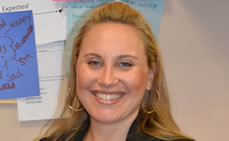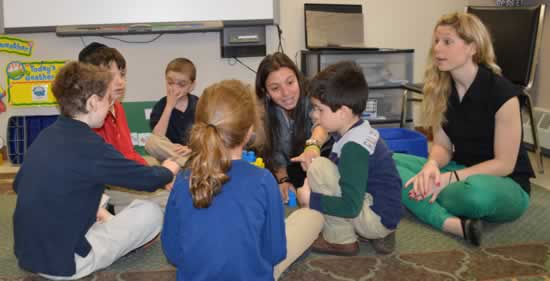 PROFILES IN SPECIAL EDUCATION
Sara Daum: Dir., Children’s Academy & Clinical Dir., McCarton Center
Interviewed By Dr. Pola Rosen. Transcribed By Valentina Cordero
PROFILES IN SPECIAL EDUCATION
Sara Daum: Dir., Children’s Academy & Clinical Dir., McCarton Center
Interviewed By Dr. Pola Rosen. Transcribed By Valentina Cordero

Pola Rosen (PR): How old is the Children's Academy?
Sara Daum (SD): This is our fourth year.
PR: Did you found this academy?
SD: Yes. Four years ago, we had a parent whose child was actually attending the [McCarton] Center. The child had speech and language and fine motor delays. As the mother was going through the admissions process for the speech and language schools in the city, she felt that there wasn't a school that fit her child’s needs. She met Dr. Cecelia McCarton and we started the Children's Academy.
PR: Your background is in speech and language pathology and disorders. What are some of the difficulties with which children have come to you?
SD: Some children have expressive language disorders accompanied by receptive language issues: these children have trouble understanding what’s being said to them; they sometimes have phonological disorders, oral motor disorders, and problems with social skills (pragmatic language) and play skills.
PR: We all know that early intervention is one of the most important things in this field. At what age do you generally begin to see things that are happening, that need to be addressed?
SD: You can really see it quite early. I see children around 16, 17, 18 months of age, right before they have their well-child check at two years of age.
PR: What kinds of things do you see at that particular age?
SD: By 18 months, children should have words. Some children become frustrated or have temper tantrums or appear as if they are not paying attention when they can’t express themselves or understand what is being said.
PR: How do you know that some of that frustration is not due to poor parenting?
SD: Part of the evaluation process is watching the parents and the primary caregivers interact with their child. I haven’t really seen poor parenting. I’ve seen parents whose children are speech and language delayed and they’re not quite sure how to interact with them or how to meet the child’s needs. At that age there is a lot of homework given to the parents. A therapist will say, “I’m working on this, and I want you to work on this at home so that there can be carryover.” And I think that can be very empowering to a parent because they want to help and they just need the direction to do so. It makes them feel so much better, because they are actively helping their child.
PR: How often do you see a young child with their parents?
SD: Usually at that age, we’ll try to see them two to three times a week. I start at twice weekly but if we determine that a child needs more, we increase the number of sessions.
PR: Do you also have parent workshops where parents can come and learn what they can do on their own?
SD: Yes, we teach them how to play with their child, how to feed their child, how to interact with their child, and how to make their language grow and expand.
PR: Is it possible for a child to not speak until five or six years old and still be perfectly normal?
SD: This is always the big question for parents when they come in. There is a wide variation in the development of language. If a child is in the six-month delay range, we could wait and see for three months because the child may develop these skills on their own, or they may not. Most parents do not want to wait and will say, "No, I want to do the more aggressive route and make sure that the skills are going to come in.
PR: Is that okay to do?
SD: It is, because the children actually love the therapy. The therapy is all through play at that age, so for them it’s one-on-one playtime. They especially love it if they have siblings because it’s special attention given to them or if they’re around two or three years of age and a new baby has come into the house, it’s special time with the speech therapist and its all play. Now though, we don’t wait and see if the child will develop the language skills on their own. Thirty or forty years ago, we might have waited because we didn’t have an understanding and we didn’t have early intervention. But now it’s “Let’s put the jumper cables on and get it going.” We don’t have to wait and see.
PR: Do you make any use of MRIs or brain scans?
SD: No, because most of the time, unless you’ve had a stroke, the child will have a normal brain scan or normal MRI.
PR: What are some of the most difficult challenges that you have to face?
SD: The growth of autism has really changed the profession. I think it changed the entire therapeutic world in terms of how to work with children, how to treat children with autistic delays. It is a spectrum disorder, so you cannot compare one child on the spectrum with another. They are individualized. I think that has been more of a challenge because we’re beginning to understand how to treat it and how to work with children on the spectrum, and work with their families, and work with their siblings. Working with parents is always very important, but it is also very difficult at times because naturally we empathize and naturally we feel sad when a parent is upset when their child is not speaking. They just want what every other parent wants: They want to hear their child's voice say, "Mommy, I love you". That is all they want. They’re not asking for a lot. You have to be honest and you have to be straightforward and you have to let them understand what’s going on, but it is a hard process, and you have to let the parent grow through the process and help them understand their child.
PR: What is your linkage with the McCarton Center?
SD: I still am the Clinical Therapy Director of The McCarton Center. The McCarton Center does evaluations and has a therapeutic division of 25 therapists (speech/language, occupational therapists, psychologists, applied behavior analysts) that treat a wide range of developmental disabilities.
PR: What is the age range of kids in the Children’s Academy?
SD: We have kindergarten, first, second, third, and next year, we will also have fourth graders. It is growing, and eventually we hope to go to the eighth grade.
PR: How many children do you have currently?
SD: Right now I have 22 children. They come for the entire day, from 9am to 3pm, and are from Westchester, Queens, Brooklyn, the Bronx, Manhattan. Our calendar follows the same calendar as the Board of Education, but we are a 12-month school.
PR: How does the busing work? Do you have private buses?
SD: No. The parents use the busing that is supplied through the city, through the office of transportation. When they have their IEP (individual education plan) meeting, they have to ask to receive busing because every child in the city is entitled to it regardless of whether the child attends a private school or a state school.
PR: Somebody once said that the most frustrating thing is when you have ideas and thoughts and you can’t express them. What do you think?
SD: I can’t even imagine how frustrating that must be.
PR: What are some of the triumphs you’ve had?
SD: So many. I’ve had children that came in to kindergarten who were not speaking at all. And now they are in second or third grade and are completely verbal. I’ve had children that were very verbal, but you couldn’t understand them and now everyone including their peers understands them. We have children who didn’t understand what was being said to them (processing disorder) and now they understand when their parents or friends speak to them.
PR: Was that because of an impediment?
SD: The issues were oral motor planning, language processing, verbal formulation, and verbal organization. These are language deficits. With intensive intervention it is so gratifying to watch them at recess, laughing with each other, playing with each other, interacting with each other, and having the skills to do so. What a joy to watch their self-esteem, watch the children learn to read, watch children who hated math, love math, watch children be able to play soccer after school and do karate. For many years, children felt less about themselves. The Children’s Academy allows them to feel confident and special, and that they can excel at some things.
PR: Would you say that the curriculum interweaves speech and language therapy with academic subjects?
SD: Yes. Our ratio 6:2:1 (six children with a teacher, a teacher’s assistant and a speech/language therapist who is always in the classroom). It’s a two-to-one ratio. The speech therapist is in charge of language arts and schematic play. She ensures that language goals are infused throughout the entire curriculum. The children have a full academic program based on New York State standards for reading, math, writing, science, geography, and computer skills.
PR: Are there specific books that deal with vocabulary for kids?
SD: There are specific books that focus on vocabulary skills for children. Many research studies will list the 50 most common words that a child has. I think that what is really important is to look at the child and see what’s reinforcing for the child, and what’s motivating for the child. Those are the words to focus on — the words that are a part of their lives every single day. Words have to have meaning to a child. They need to have a mental meaning in order for a child to understand what the word means and to be able to use it. #
